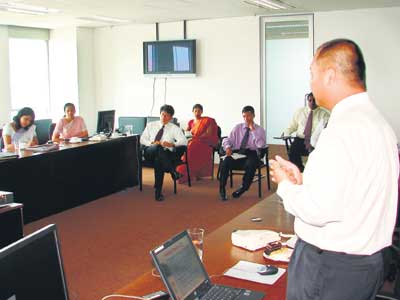
Capital markets plan fast trackedThe ambitious plan by the Securities & Exchange Commission (SEC) comes at a time when Sri Lanka’s economy is facing a multitude of problems like rising government spending and an expanding defence budget due to an escalation in the military conflict with the LTTE.
A 10-year master plan to develop Sri Lanka’s capital markets and bring it in line with international bourses is being fast-tracked to two years to speed up the process. The ambitious plan by the Securities & Exchange Commission (SEC) comes at a time when Sri Lanka’s economy is facing a multitude of problems like rising government spending and an expanding defence budget due to an escalation in the military conflict with the LTTE. “We decided a month ago to fast track the development plan to two years (end 2008) as we felt it had to be expedited (instead of completion in 2015). The fresh process is being done under the guidance of Ernst & Young, Malaysia that did the master plan for the Malaysian capital markets,” noted Channa de Silva, Director General of the SEC. The regulator moved to more spacious floors in the World Trade Centre (WTC) in Fort last month with state-of-the-art facilities because in de Silva’s words: “We want to look and work like an investment bank” In a comprehensive interview with The Sunday Times FT, the SEC Director General dealt with a range of issues including the recruitment of high-profile staff, inclusion of new surveillance systems to deter share trading violations, a possible new index to replace the MILANKA, changes in the mandatory offer rule when a single buyer goes over the 30 percent limit, and greater scrutiny of annual reports. Asked whether the market is ready for this change when the economy is in a crisis, de Silva responded: “the average return at the CSE has been very high in the past few years.” He said the capital markets plan seeks to strengthen the supply side by bringing in more companies and deal with derivatives, debt and more equity products. The SEC is looking at ‘enticing’ five to 10 non-listed, top conglomerates that are attractive to investors with incentives like equity from state funds - the EPF and ETF – if there is a shortfall in full subscription of a public offer. De Silva said they were planning road shows in Hong Kong, Dubai and the United States, the last named has seen an increasing number of high-risk institutional investors. “Saudi investors are also showing a lot of interest since US markets appear to be closed to them. We need to create the bridge to rope in such investments.” Foreign stockbrokers are to be encouraged to join the Colombo bourse while plans are underway to activate unit trusts. “We are creating the structures, the legislation, the supply, the demand and the bridge. We will create a very reliable transparent system,” he said. The Takeovers and Mergers Code is to be amended in relation to the 30 percent mandatory offer provisions. “Now it happens automatically but say for example in the case of SLT (in the issue of some shares being sold by NTT to Maxis), if the foreign buyer steps over the 30 percent mark it may not be the right thing for the state. In such cases, any stocktaking over 30 percent will trigger the mandatory call provision but its implementation will be on a case by case basis,” de Silva said.
|
|
||
| || Front
Page | News
| Editorial
| Columns
| Sports
| Plus
| Financial
Times | International
| Mirror
| TV
Times | Funday Times|| |
| |
Copyright
2007 Wijeya
Newspapers Ltd.Colombo. Sri Lanka. |
